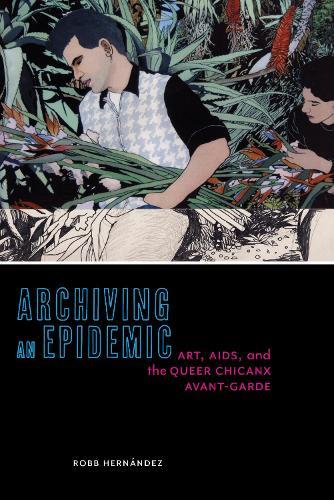Full Product Details
Author: Robb Hernández
Publisher: New York University Press
Imprint: New York University Press
ISBN: 9781479820832
ISBN 10: 1479820830
Pages: 320
Publication Date: 19 November 2019
Audience:
Professional and scholarly
,
Professional & Vocational
Format: Paperback
Publisher's Status: Active
Availability: Manufactured on demand

We will order this item for you from a manufactured on demand supplier.
Reviews
Hernandez queers the archive while also stepping outside its institutional limits and into the realm of the absences and shards of human loss from AIDS. In doing so, Hernandez develops an alternative methodology for 'queer detrital analysis' that brings the body and space to bear. A tour de force in its archival and critical breadth, this book vividly reimagines the American avant-garde since the 1960s through queer Chicanx artists, groups, and spaces in Southern California. -- Chon Noriega, University of California, Los Angeles Provides a detailed, sensitive, and textured account of the precarious histories of queer Chicanx artists during the first decades of the ongoing AIDS crisis. This remarkable book offers new ways of thinking about how to reconstruct such histories by attending to the emotional and spatial qualities of the archives, homes, detritus, mementos, and memories that Hernandez explores with the reader. While Archiving an Epidemic is a groundbreaking historical recovery of queer art in Los Angeles in the 1980s and 1990s, it is also a reflection on loss, absence, silence, and the threat of erasure. Not only will this book be an essential text in the literatures on queer art, Chicanx art, and the AIDS pandemic, it should be read by anyone confronting archives and their limits. Indeed, no one studying American art and culture of the late twentieth century can afford not to read this book. -- David J. Getsy, School of the Art Institute of Chicago
Hernandez queers the archive while also stepping outside its institutional limits and into the realm of the absences and shards of human loss from AIDS. In doing so, Hernandez develops an alternative methodology for 'queer detrital analysis' that brings the body and space to bear. A tour de force in its archival and critical breadth, this book vividly reimagines the American avant-garde since the 1960s through queer Chicanx artists, groups, and spaces in Southern California. -- Chon Noriega, University of California, Los Angeles Provides a detailed, sensitive, and textured account of the precarious histories of queer Chicanx artists during the first decades of the ongoing AIDS crisis. This remarkable book offers new ways of thinking about how to reconstruct such histories by attending to the emotional and spatial qualities of the archives, homes, detritus, mementos, and memories that Hernandez explores with the reader. While Archiving an Epidemic is a groundbreaking historical recovery of queer art in Los Angeles in the 1980s and 1990s, it is also a reflection on loss, absence, silence, and the threat of erasure. Not only will this book be an essential text in the literatures on queer art, Chicanx art, and the AIDS pandemic, it should be read by anyone confronting archives and their limits. Indeed, no one studying American art and culture of the late twentieth century can afford not to read this book. -- David J. Getsy, School of the Art Institute of Chicago
Provides a detailed, sensitive, and textured account of the precarious histories of queer Chicanx artists during the first decades of the ongoing AIDS crisis. This remarkable book offers new ways of thinking about how to reconstruct such histories by attending to the emotional and spatial qualities of the archives, homes, detritus, mementos, and memories that Hernandez explores with the reader. While Archiving an Epidemic is a groundbreaking historical recovery of queer art in Los Angeles in the 1980s and 1990s, it is also a reflection on loss, absence, silence, and the threat of erasure. Not only will this book be an essential text in the literatures on queer art, Chicanx art, and the AIDS pandemic, it should be read by anyone confronting archives and their limits. Indeed, no one studying American art and culture of the late twentieth century can afford not to read this book. -- David J. Getsy, School of the Art Institute of Chicago Hernandez queers the archive while also stepping outside its institutional limits and into the realm of the absences and shards of human loss from AIDS. In doing so, Hernandez develops an alternative methodology for 'queer detrital analysis' that brings the body and space to bear. A tour de force in its archival and critical breadth, this book vividly reimagines the American avant-garde since the 1960s through queer Chicanx artists, groups, and spaces in Southern California. -- Chon Noriega, University of California, Los Angeles
Author Information
Robb Hernández is Assistant Professor of English at the University of California, Riverside. He is the co-curator of Mundos Alternos: Art and Science Fiction in the Americas for the Getty Foundation's Pacific Standard Time: LA/LA Initiative.



